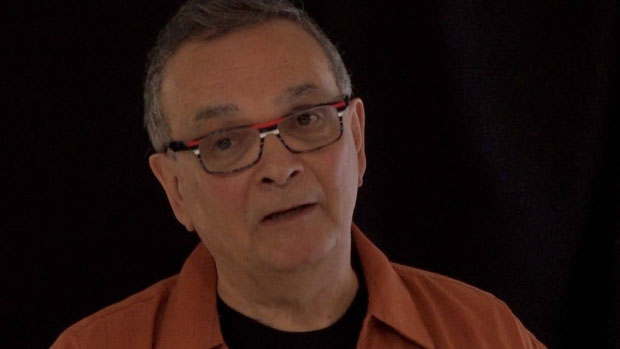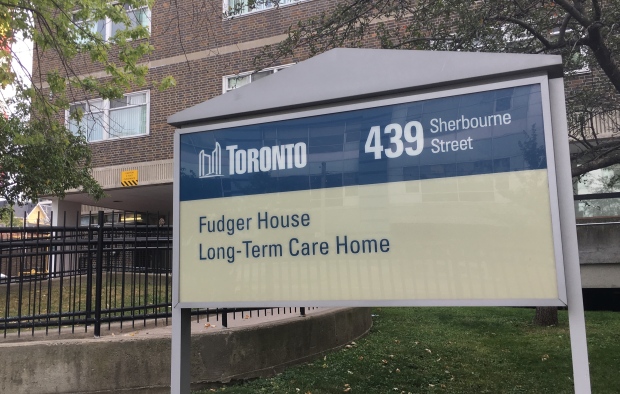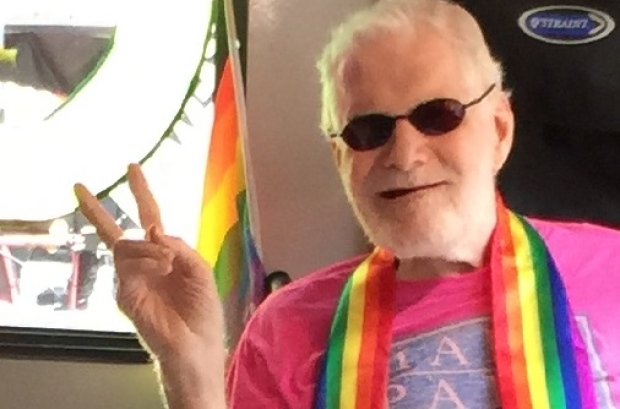Feeling at Home: Staff trainers help LGBT seniors overcome fears in long-term care
Better training aims to quell distrust from decades of prejudice
By Patrick Butler, CBC News Posted: Aug 27, 2017 5:00 AM ET Last Updated: Aug 27, 2017 5:00 AM ET

Brian Hobbs is one of a team of trainers with the Ottawa Senior Pride Network who is trying to teach staff at long-term care facilities about how to treat LGBT seniors. (Mary Harvey/Ottawa Senior Pride Network)
Brian Hobbs remembers standing lookout while his friends, a gay couple in their 70s, performed the most innocent of acts: holding hands.
One of the men had moved into a long-term care home outside Ottawa after being diagnosed with Alzheimer’s in 2014, and Hobbs would chauffeur his partner back and forth so they could spend time together. But the man in the home was scared he might be ostracized if staff ever saw him touching his partner.
The pair would hold hands while seated on the bed, and whenever a worker was about to come into the room, Hobbs would signal to the couple so the man in better health could jump up and pretend he was doing something else.
The story is still seared into Hobbs’s memory. But anecdotes like this are the reason he feels the work he does is so necessary.
- For Canada’s LGBT community, acceptance is still a work in progress, survey suggests
- Transgender Canadians should ‘feel free and safe’ to be themselves under new Liberal bill
Since 2008, Hobbs and a group of volunteers with the Ottawa Senior Pride Network have spearheaded an effort, now mirrored by other groups across the country, to make LGBT seniors feel more comfortable in long-term care facilities.
Hobbs and 13 other volunteers train senior care workers in roles ranging from massage therapist to home care helper to funeral parlour staffer on how to be more conscious of the legacy of fear and prejudice many LGBT seniors still feel.
“What we’re hoping is that if staff are given some type of sensitivity training about LGBT seniors and their concerns, that maybe their attitudes and behaviours will change,” Hobbs said.
No easy task
LGBT seniors, wary of their new living environments, often feel forced back into the closet once they enter long-term care facilities, said Helen Kennedy, executive director of Egale Canada, a national LGBT advocacy group that offers similar workshops in seniors homes across the country.
“The impact that that has on your self-esteem, on your confidence, especially in the last five, 10 years of your life, is very traumatic,” she said.
Kennedy said that because many LGBT seniors don’t feel comfortable revealing their sexual orientation or identity, some facilities aren’t even aware they have LGBT residents.

Fudger House, operated by the City of Toronto, is one Canadian long-term care facility with a reputation for being an inclusive place for LGBT seniors to spend their twilight years. (Patrick Butler/CBC)
“We have had instances where we call long-term care facilities and they say, ‘We don’t have anyone like that in our facility,’ ” she said. “Well, you don’t because it’s not open and it’s not inclusive and it’s not safe. And they may be there, but they’re closeted.”
Indeed, a June online consultation conducted by Egale Canada found 52 per cent of LGBT seniors feared being “forced back into the closet” in residential care. And a 2015 survey of Ottawa LGBT seniors commissioned by OSPN found only 45 per cent felt they would be accepted by a long-term care facility and its staff.
Devan Nambiar, education co-ordinator for Rainbow Health Ontario, a division of Toronto’s Sherbourne Health Centre responsible for delivering LGBT seniors-related training to health-care professionals across the province, said there can be significant health consequences when seniors don’t feel comfortable revealing their sexual orientation or identity to workers at long-term care homes.
He said they can face serious mental health problems because of their new, uninviting and likely permanent surroundings and staff, and can run into health complications if they feel uncomfortable disclosing medical conditions such as HIV diagnoses.
Slow but steady impact
Hobbes said the people he trains learn how to be more cognizant of the faulty assumptions they can make and the language they should use when speaking to LGBT seniors.
He said it’s information that staff often don’t realize they need to know to give proper, inclusive care.
The network’s training takes groups as large as 50 through a history lesson of the prejudice against LGBT people in Canada and around the world, beginning with their treatment at the hands of the Nazis in the Second World War and ending with the Canadian Psychiatric Association’s decision in 1973 to declare that being gay was no longer a mental illness.
“That’s kind of where we end it because it’s to say that if you put yourself in the shoes of an 80- or 90-year-old person, this is what they’ve lived through,” said Hobbs.
- New study finds discrimination against LGBT adults in care facilities
- LGBT seniors in Calgary struggle to find connections in digital world
Trainees also go through role playing and case studies, such as what to do if a group of residents decides they no longer want to eat lunch with another resident after they find out she’s a lesbian.
Hobbs said the learning curve can be particularly steep when trying to sensitize the many health-care workers he trains who are new to Canada and for whom “this is the first time, really, they’ve ever had this discussion about LGBT.”
Still, Nambiar said he’s seeing a slow but steady shift since Rainbow Health Ontario began giving training sessions to health workers, including 60 workshops in the past year alone.
He said those workshops have helped long-term care facilities fix issues such as intake forms for residents that assume people have a husband or wife of the opposite gender — details that might seem trivial at first to staff, but which can have a profound impact on how welcome LGBT seniors feel.
“It’s a learning curve for everyone, it’s slow going, but it is having a gradual impact,” said Nambiar.
Reason for hope
Some of Canada’s long-term care homes have been making inclusive seniors care a priority for years.
Fudger House in Toronto has long enjoyed a reputation as a seniors home tailored to elderly LGBT people. Facility administrator Nancy Lew said it is no doubt buoyed by the City of Toronto’s soon-to-be-updated LGBT toolkit, launched as a guide for senior care providers in 2008, as well as the home’s close relationship with community groups in the nearby gay village.
Vancouver’s Haro Park Centre has likewise forged strong ties with local LGBT organizations and made a concerted effort to create what executive director Dean Malone calls an “accepting culture” at the home.
It’s a fact that isn’t lost on resident Glenn Saunders, an LGBT senior who lives there.

Glenn Saunders, 67, said he has noticed ‘an acceptance of diversity’ at Vancouver’s Haro Park Centre long-term care home, where he has lived since 2009. (Dean Malone/Haro Park Centre)
“The attitude toward gay people here is quite balanced,” said Saunders, 67, who entered the long-term care centre after suffering a massive stroke and brain bleed in 2009.
Along with seniors events organized through a partnership between Haro Park and B.C. LGBT group Qmunity, Saunders took part in the Vancouver Pride this year when the centre organized a bus to drive in the parade.
“The staff are very clued in and all the care staff are quite good with it,” he said. “There’s an acceptance of diversity here.”
- Ottawa to formally apologize to LGBT community for past wrongs
- Rights groups and opposition urge Liberals to help those fleeing anti-LGBT violence in Chechnya
But work remains to be done for volunteers like Hobbs, who said he has a personal stake in continuing the training he delivers.
“There might be a time in the next few years where I might be in a long-term care facility, I don’t know, and I would hope that if that’s case, and people are aware that I am gay, that I would be treated with the same respect that everyone else is afforded,” he said.
“A lot of people say it’s fine today and the discrimination isn’t what it used to be and hopefully that’s true. Yet there is fear.”